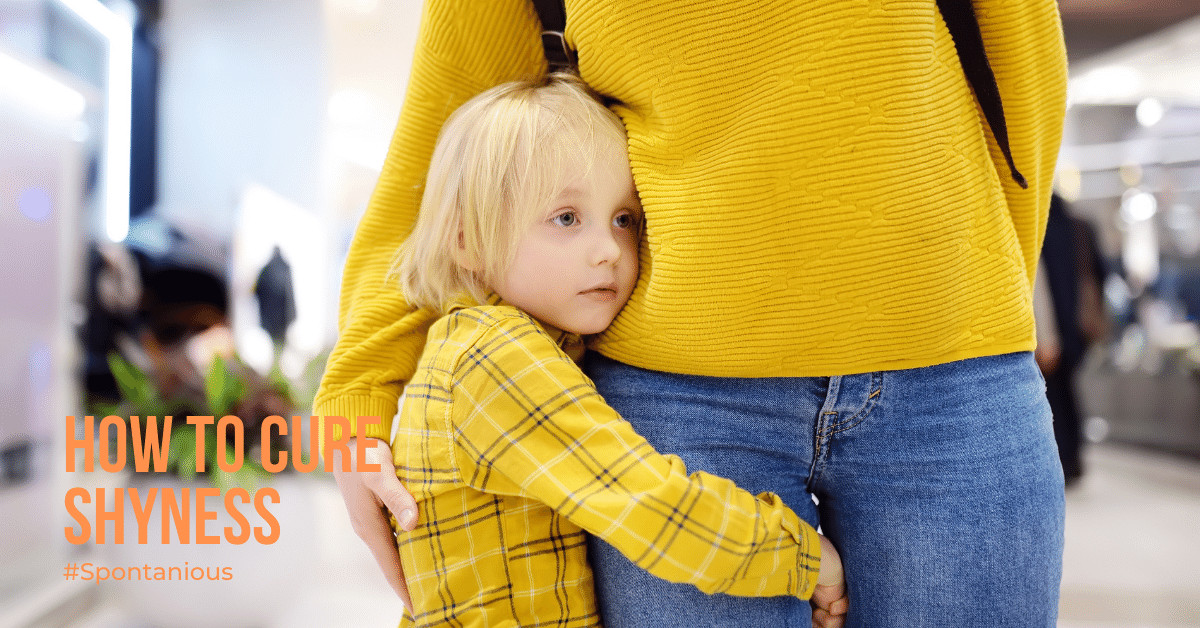Is shyness a bad thing and can I get rid of it?
We all remember how as a young child we could hide ourselves behind our father or mother in a strange situation. Despite the lovely smile of that nice Mr. or Mrs., we didn't want to shake hands for no reason and we would hide away skittishly. We were shy and almost every child suffers from this to a greater or lesser degree.

This is also part of the age because we want to discover what is strange, uncomfortable, or new, carefully, without putting ourselves in danger of being embarrassed. But how does shyness work as we get older and what is shyness really?
Shyness is partly innate
Shyness has a lot to do with our "flight" or "fight" responsese which is innate. Some people want to fight a threat and others want to run away. Even though we can unlearn or suppress this behavior, the real question is whether there is a real threat. After all, what is the threat if we are shy about being rejected, speaking in front of a group, or meeting new people, for example?
Shyness occurs mainly because of the prediction we make ourselves about the outcome of a (new) particular situation. Somewhere between 20% and 40% of people, according to studies around the world, suffer from this to a greater or lesser degree. So what do we do ourselves in our heads that makes us so shy?
Shyness is an internal reaction to a new situation
Even world-famous singers can be nervous and even shy the moment they step on stage. Even though they have sung the songs thousands of times in front of different groups, they still experience this group as something new.
At the Center for Anxiety Disorders and Trauma in London, there is a clinical psychologist Chloe Foster and she claims that shyness in itself is quite normal. It only becomes a problem when it turns into anxiety about social interactions.
Yet many people experience their own shyness as an obstacle to showing their true selves or doing or saying what they would like to in certain situations. It can feel like being trapped in your own world of fear for no specific reason.
What can be the reasons for shyness? 3 causes.
To solve shyness, coaches and psychologists first want to know what causes the shyness in a person. This can have 1 or more causes.
Below are the 3 most common causes why a person can be shy at adult age:
1. Lack of self-esteem:
Self-esteem is the ability to appreciate your own qualities. When you realize that you too are worthy of being present, speaking out, and behaving the way you want, you lose your shyness.
If you ask yourself who you are, you will get very different answers than if you ask yourself what you can do. Being has to do with self-esteem. Being able to do something has nothing to do with that. Being able to do something is about self-confidence.
People who are shy can too often ask themselves whether they can do something or not. Can I be fun and sociable in this group, can I speak in public or can I be a nice date, are about self-confidence.
If you ask yourself if you can be present somewhere, if you are worthy of being on a stage, if you are a person who can be a little quieter around people, it is about self-esteem. The more self-esteem, the less shy you will be.
2. Negative predicting:
Negative predicting is a cognitive distortion that you can read more about here. People who are very good at this believe that based on past experiences with a negative outcome, all future experiences will also have the same outcome.
They forget that each situation and experience stands on its own because of the context, time, and situation in which the experience arose. If you have had a car accident at a dangerous intersection three times, this does not mean that every dangerous intersection will result in an accident. People who predict negatively may, contrary to reality, become convinced of this and never want to drive a car again.
Similarly, people who predict negatively may have had a few unpleasant experiences in a group setting and as a result, predict that all future experiences will also be unpleasant.
This will make them appear shy, when in fact it is a self-learned fear that causes the shyness.
3. Destructive relationships:
Parents can (unintentionally) have a negative influence on their children. By belittling, putting way too much focus on performance, or criticizing a lot, children can begin to feel inferior to other children. This can also result in shyness.
People who live with a narcissistic partner can have the same thing happen to them. Due to the oppressive nature of a narcissist, the person will become more in the background and exhibit shy behavior.
How to get rid of shyness?
Becoming less shy frees up space for spontaneity. It gives you a sense of space and freedom to be who you are. Coaches and therapists can make you feel this space and freedom in a number of sessions. By putting into practice various exercises and insights, under the guidance of a coach or therapist, you will find that living without shyness is also possible for you.
The coach or therapist will let you process possible traumas from the past, help you not to predict more or less negatively, and increase your self-esteem. Especially the latter will ensure that your shyness will no longer have a place in your life.
-
Mursal AhmadiPsychologist / CoachUS$ 1,41 pm
-
Michelle MéndezHelping othersUS$ 0,17 pm
-
Shayna Lmental health nurseUS$ 0,51 pm
-
Monisha DoleyLife coach, authorUS$ 0,80 pm
-
Shane van WeeliePsychologistUS$ 1,10 pm
-
Nilufar ArmakiPsychotherapistUS$ 1,13 pm






































